Don't wanna be here? Send us removal request.
Text
Week 10: Overview


0 notes
Link
Our last conference! You need to have a FULL working draft of the Digital Portfolio! We will meet on Wednesday, November 13th.
0 notes
Text
Research Journal 9
In reflecting, we can change, we can transform, we can envisage. -- Ann Berthoff
Reflection gives you a change to take charge of your education, but often times, you don’t realize you have capability to do so: you complete an assignment to get a grade; you enroll in a class because it fulfills a requirement; or you simply don’t engage with the material of a class. The type of reflection you are going to do to conclude this course helps move you towards becoming the active “agent,” thus, you are going to conclude this quarter by being extremely mindful and openly honest by assessing ... yourself.
In as many words as you feel necessary, please asses yourself in this course. Below are some things to think about/with and the opening of my assessment letter to you all.
Please conclude your self-assessment with a “rate my student” response following the exact same measures as “rate my professor” does.
Good luck! :-)
Things to think about before beginning:
1. Learning and effort are not one the same *but* they do compliment each other. 2. Writing is a process, so review your entire “portfolio” of work from the quarter: from Tumblr posts to Sunday Somethings to major assignments to in-class work and participation. We’ve had (or will have by Sunday) 9 Research Journals; 8 homework Tumblr posts; 2 maps; 1 scavenger hunt; 2 extra credit “games,”; 3 major writing assignments (various drafts); several drafts of your theory of writing; many, many discussions; and lots of reflections where you were asked to challenge yourself in being uncomfortable. 3. What did you first believe about writing and research? What do you now believe about them? Has it been revised? Built upon? Remained exactly the same? How do you know? 4. Have you been an active, engaged participant? Have you texted repeatedly in class? Have you missed more than 2 days of classes? Have your assignments been perpetually late or written in haste at 3:00 in the morning? Have you actually completed ALL of the required work for this course and do so on time 5. Why is “writing so much more than a grade?” 6. You are not evaluating yourself ... you are assessing yourself. Please keep that in mind.
Arguable the most important question to ask yourself and to be able to articulate in concrete ways ... What have you learned?
As a reminder ... here is what the opening of my assessment letter to you said:
We are told that college prepares us for life – whatever “life” may be for us outside of college. It could be a career in the business world, it could be as medical doctor, it could be as a professional athlete, it could be as manager of a 5 star resort. Our goal(s) while in college are to learn skills, knowledges, and practices that will enable us to be successful in life past college. As freshmen, sometimes it can be difficult to imagine this because you still have several years of college left to complete, but even as a freshmen you still begin to learn information and practices that will carry forward with you. The hope of any course – whether it’s a writing course, a course in the major, or a common core course – is that you learn a knowledge, a practice, or a skill that you transfer to another context, experience, or situation. In order for this to effectively happen, our focus needs to shift slightly from only thinking about the grade to thinking about what we are learning – this, of course, is challenging. We are told from a young age that grades matter, and while they do matter, they should not be the only, main, live-or-die, focus – we are limiting our ability to truly open up and learn by doing so. Why? Because the focus is only on the grade – in a writing class, this tends to mean that students write with the sole focus of getting an “A” or getting a “B” instead of focusing on the process, the audience, the rhetorical situation, etc. We also limit our ability to take a risk for fear of doing something “wrong” or write simply to “please” the teacher; however, to put this into perspective by a well-known, fairly successful writer:
Writing isn’t about making money, getting famous, getting dates, getting laid, or making friends. In the end, it’s about enriching the lives of those who will read your work, and enriching your own life, as well.
― Stephen King
In short, writing is so much more than writing for a grade.
0 notes
Text
Week 9 Overview

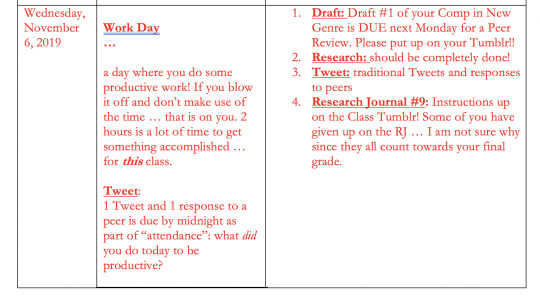
0 notes
Link
Please sign up for a conference for next Monday, November, 2019!
0 notes
Text
A Check-list: To Help Ease the Stress

0 notes
Text
Tips for Analyzing Qualitative Research
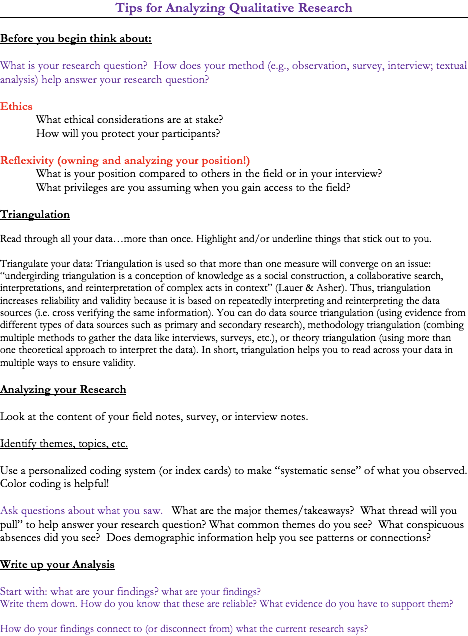
0 notes
Text
Week 8: Overview
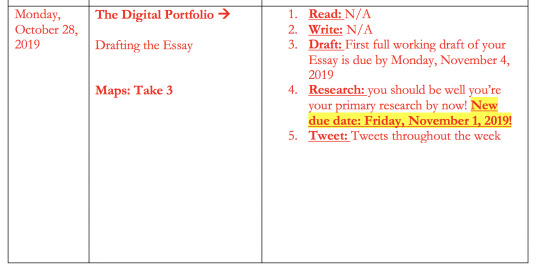
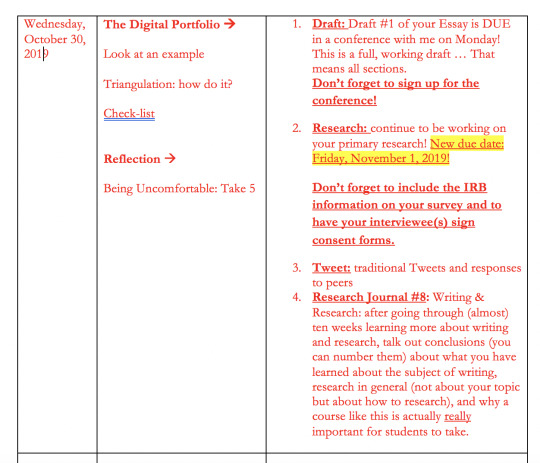
0 notes
Text
Homework Post #8
In this post, you are exploring what it means to "transfer" learning/knowledge from one situation to another. Some questions to springboard your thinking and musing:
What are contributing factors to successful transfer? Why is transfer important in education? What helps it along? Why is transfer of learning/knowledge important? Do you believe transfer happens whether you think about it or not? Why/why not?
By the end of the post, it should be evident what transfer of learning/knowledge is, how it can be achieved, and why it's important, especially within the first year of college. Please pull directly from the reading to ground your thinking (a lot of you have not been doing this even when it’s mentioned to do so ... if you revisit the requirements of Tumblr, this is one of them!).
DUE by Wednesday, October 23, 2019 by class time.
Don’t forget to do a ST in response to the reading!
0 notes
Text
Week 7: Overview

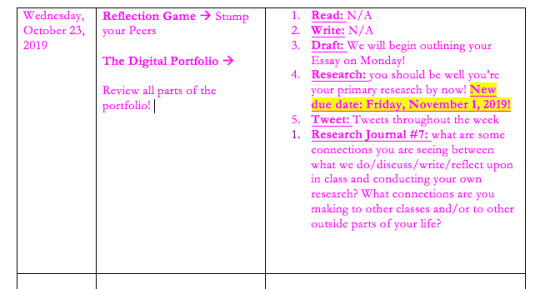
0 notes
Text
Homework Post #7
Failure can be an important part of writing development.
Agree or disagree pulling on the reading to support your response.
Next, create meme that represents your response to this threshold concept.
One little caveat: you can NOT pull an image from the web. You have to actually use one of your own images taken with your phone and/or your camera. There are lots of meme generators out there to use or you can simply use a picture and add a caption to it (Tilly serves as an example below! :-).
DUE by class time on Monday, October 21, 2019.
Don’t forget to do a ST in response to the reading.
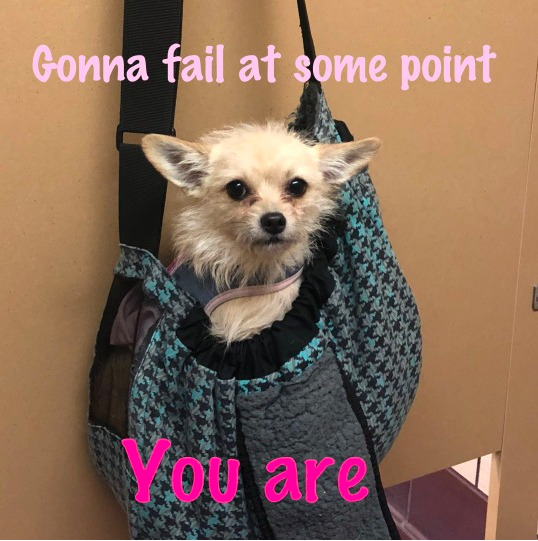
0 notes
Text
Conference: Part 2
Part 2 of Conference Day: it is DUE on Wednesday, October 16, 2019 @ 11:59 pm to your Tumblrs. This is part of your attendance for the day.

0 notes
Text
Week 6: Overview
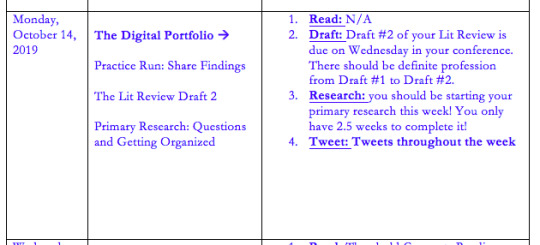
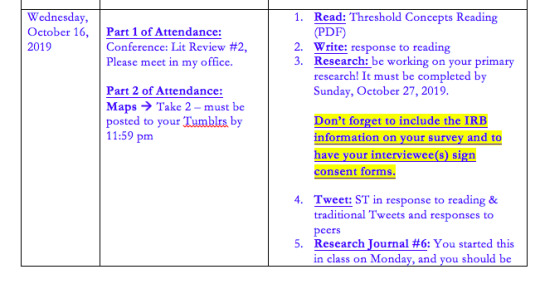

0 notes
Link
Conference over Draft #2 of the Lit Review. Please sign up!
0 notes
Text
Week 5 Overview
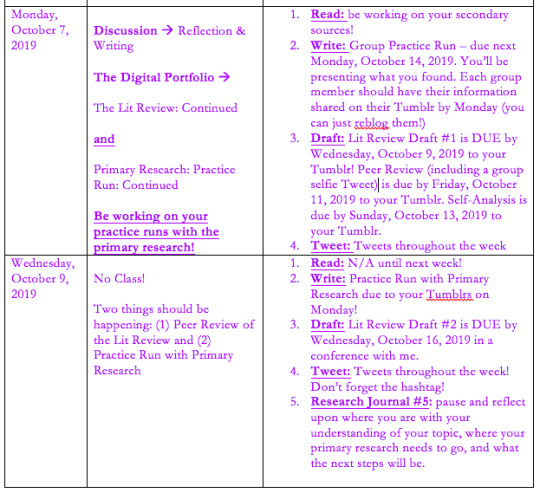
0 notes
Text
Homework Post #6
Reflection is an important part of writing – many theorists may disagree on how to define reflection (as the Yancey reading notes), but they all agree that reflection is a pivotal part of the writing process. In fact, it has been argued that reflection transforms how you, the student, and you, the writer, view and understand writing and yourself as a writer. After reading about reflection, please use the following questions to springboard your thinking:
1. How might you define reflection?
2. How can reflection help you better understand yourself as a writer? Better understand specific writing situations whether in this class, in another class, for a job, or even on social media?
3. What relationship does reflection have with writing? With learning?
DUE by class time on Monday, October 7, 2019.
ST: pick EITHER Yancey OR Higgins to respond to!

0 notes
Text
Week 4 Overview
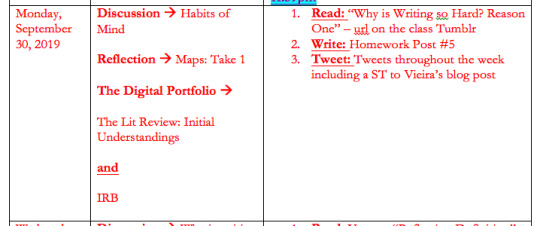
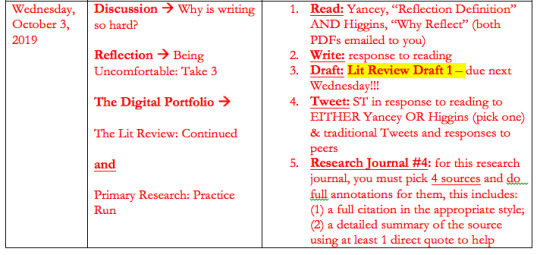

0 notes